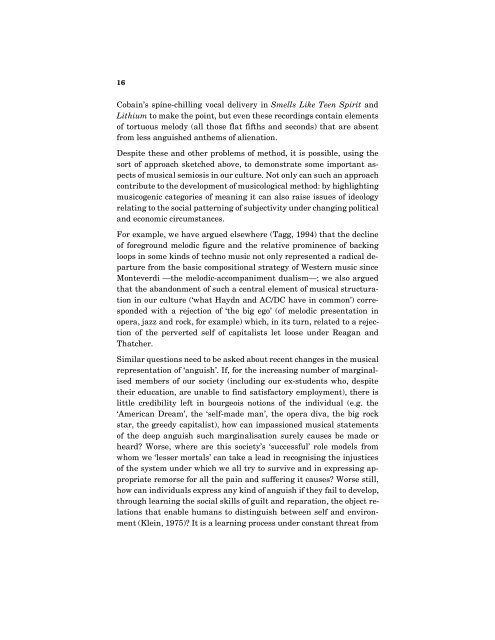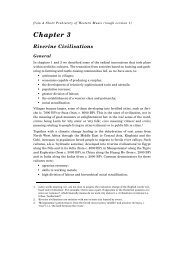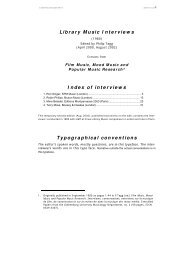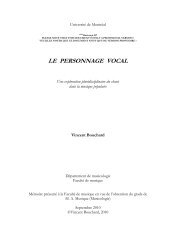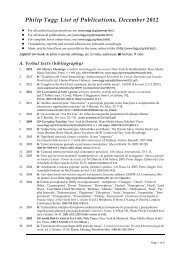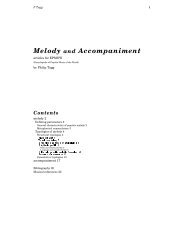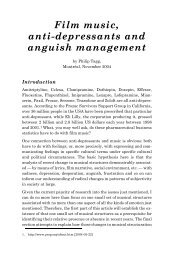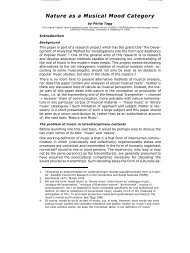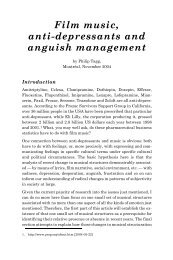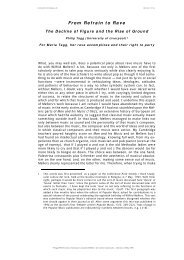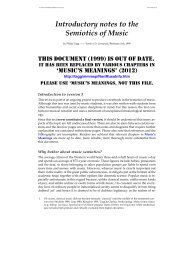You also want an ePaper? Increase the reach of your titles
YUMPU automatically turns print PDFs into web optimized ePapers that Google loves.
16<br />
Cobain’s spine-chilling vocal delivery in Smells Like Teen Spirit and<br />
Lithium to make the point, but even these recordings contain elements<br />
of tortuous melody (all those flat fifths and seconds) that are absent<br />
from less anguished anthems of alienation.<br />
Despite these and other problems of method, it is possible, using the<br />
sort of approach sketched above, to demonstrate some important aspects<br />
of musical semiosis in our culture. Not only can such an approach<br />
contribute to the development of musicological method: by highlighting<br />
musicogenic categories of meaning it can also raise issues of ideology<br />
relating to the social patterning of subjectivity under changing political<br />
and economic circumstances.<br />
For example, we have argued elsewhere (<strong>Tagg</strong>, 1994) that the decline<br />
of foreground melodic figure and the relative prominence of backing<br />
loops in some kinds of techno music not only represented a radical departure<br />
from the basic compositional strategy of Western music since<br />
Monteverdi —the melodic-accompaniment dualism—; we also argued<br />
that the abandonment of such a central element of musical structuration<br />
in our culture (‘what Haydn and AC/DC have in common’) corresponded<br />
with a rejection of ‘the big ego’ (of melodic presentation in<br />
opera, jazz and rock, for example) which, in its turn, related to a rejection<br />
of the perverted self of capitalists let loose under Reagan and<br />
Thatcher.<br />
Similar questions need to be asked about recent changes in the musical<br />
representation of ‘anguish’. If, for the increasing number of marginalised<br />
members of our society (including our ex-students who, despite<br />
their education, are unable to find satisfactory employment), there is<br />
little credibility left in bourgeois notions of the individual (e.g. the<br />
‘American Dream’, the ‘self-made man’, the opera diva, the big rock<br />
star, the greedy capitalist), how can impassioned musical statements<br />
of the deep anguish such marginalisation surely causes be made or<br />
heard? Worse, where are this society’s ‘successful’ role models from<br />
whom we ‘lesser mortals’ can take a lead in recognising the injustices<br />
of the system under which we all try to survive and in expressing appropriate<br />
remorse for all the pain and suffering it causes? Worse still,<br />
how can individuals express any kind of anguish if they fail to develop,<br />
through learning the social skills of guilt and reparation, the object relations<br />
that enable humans to distinguish between self and environment<br />
(Klein, 1975)? It is a learning process under constant threat from


